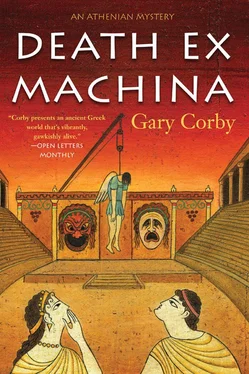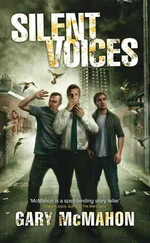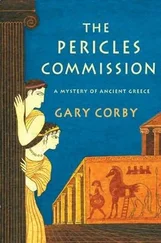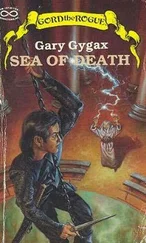Gary Corby - Death Ex Machina
Здесь есть возможность читать онлайн «Gary Corby - Death Ex Machina» весь текст электронной книги совершенно бесплатно (целиком полную версию без сокращений). В некоторых случаях можно слушать аудио, скачать через торрент в формате fb2 и присутствует краткое содержание. Год выпуска: 2015, ISBN: 2015, Издательство: Soho Press, Жанр: Исторический детектив, на английском языке. Описание произведения, (предисловие) а так же отзывы посетителей доступны на портале библиотеки ЛибКат.
- Название:Death Ex Machina
- Автор:
- Издательство:Soho Press
- Жанр:
- Год:2015
- ISBN:978-1-61695-520-5
- Рейтинг книги:3 / 5. Голосов: 1
-
Избранное:Добавить в избранное
- Отзывы:
-
Ваша оценка:
- 60
- 1
- 2
- 3
- 4
- 5
Death Ex Machina: краткое содержание, описание и аннотация
Предлагаем к чтению аннотацию, описание, краткое содержание или предисловие (зависит от того, что написал сам автор книги «Death Ex Machina»). Если вы не нашли необходимую информацию о книге — напишите в комментариях, мы постараемся отыскать её.
Death Ex Machina — читать онлайн бесплатно полную книгу (весь текст) целиком
Ниже представлен текст книги, разбитый по страницам. Система сохранения места последней прочитанной страницы, позволяет с удобством читать онлайн бесплатно книгу «Death Ex Machina», без необходимости каждый раз заново искать на чём Вы остановились. Поставьте закладку, и сможете в любой момент перейти на страницу, на которой закончили чтение.
Интервал:
Закладка:
“So are we all. I must ask you what happened, and even more urgent, where is my brother-in-law’s body?”
“At the theater.”
I told him, as succinctly as I could, what had happened.
At the word murder, Petros turned gray and staggered back until he leant against the wall. “Dear Gods, no,” he whispered.
I said, “I’m sorry to have delivered such harsh news to your wife. But we had no idea Romanos had so much family in Athens. The people at the theater could tell us nothing, except for Lakon-”
“Lakon?”
“Another actor. He told us Romanos lived in Melite, but beyond that he too had no information.”
“I see.”
“Do you know Lakon? I suppose you must know other actors, your brother-in-law having been one.”
“Everyone in this house is an actor. Even the children.”
“Oh?”
“I must ask you to excuse me. My brother-in-law’s body must be brought back here.”
I nodded. Petros was right. Already the psyche of the murdered man would be loose from its body. Romanos’s psyche needed to descend to Hades, but the psyche couldn’t begin its journey until the rites had been performed. Until then it should stay close to its mortal remains. But in the theater, alone, a psyche could become lost. The last thing Athens needed was a real psyche haunting the Great Dionysia.
No, the sooner Petros got the body back here the better. They would place the body in the inner courtyard, with its feet facing the door. That would prevent the psyche from straying.
“Do you need help?” I asked. I wouldn’t normally offer to help strangers move their dead, but I felt sympathy for these people.
“Thank you, but there are plenty of men in this house. Far too many men, in fact.”
“Many men?” I said, surprised.
“And their families too,” Petros said.
“Did you all come to Athens together?” Diotima asked.
“No. Romanos was here long before the rest of us. He is … was … an Athenian in all but name. He moved to Hellas as a young man, to make his fortune. Maia and I didn’t leave Phrygia until after we married. The others drifted in over time. It’s easier for folk from the same place to get along.”
“One last question then. Do you know of anyone who might have wanted your brother-in-law dead?”
“No.”
“Had he any enemies?”
“None that would murder,” he said shortly. “And now I must go.”
“Well that was a waste of time,” I said as we walked away.
“No it wasn’t, Nico,” Diotima said. “We told a family they were bereaved. Now they’ll collect Romanos and he won’t lie alone.”
“We’ll have to interview them again,” I said. “But not until they’ve had a chance to calm down. The next question is, which persona did the killer intend to kill?”
Diotima looked at me oddly. “What do you mean, Nico?” Diotima said. “Nobody could have mistaken Romanos for someone else.”
“No, but there were three men in the same body,” I said. “There was Thanatos the character in the play-”
“You mean someone was trying to kill the character ?” Diotima said. “What sort of a crazy person would do that?”
“Characters kill other characters,” I said.
“Characters aren’t real, Nico,” Diotima said. “Real people kill other real people. They don’t kill fictional people.”
“Then why did the killer choose to kill Romanos as if he were Thanatos?” I said. “There are so many easier ways to kill a man than hanging from a god machine on a stage, in the dead of night, with two guards close by.”
Diotima chewed at her lip while she thought about it. “The method does sound rather dramatic,” she conceded. “Or it’s a crazy person. Go on.”
I said, “Then there’s Romanos the actor. That’s how he’s best known to men in Athens. Was this a professional quarrel that turned violent? Then there’s Romanos the metic who lives in a crowded house in Melite. Nobody at the amphitheater even knew he had a family in Athens, that’s how secretive he was.”
“Nico, you’re talking about motive.”
“All right. But which of those three men did the killer intend to strike down?”
SCENE 16
It’s a strange case when you know who the body is, but aren’t sure which man died. Was it Romanos the actor? Or the character he played? Or perhaps because of his life outside the theater?
Diotima’s point that it came down to motive was true, but the three different identities of Romanos were so extreme that we felt we had to begin with this question: who was Romanos that someone would want to kill him?
Diotima pointed out that Phellis had fallen in exactly the same situation as we had found Romanos dead, and both men had been dressed as the god of death.
“It’s almost as if the play was unlucky,” Diotima said.
“Don’t be ridiculous,” I scoffed. “Whoever heard of an unlucky play?”
Diotima shrugged.
I said, “Besides, we know that Phellis was brought down by the saboteur.”
“Do we?” she asked. “Is the saboteur the same person as the killer?”
It was my turn to shrug. “We’ll have to find out.”
“What do we make of the woman who drugged the guards?”
“I think they saw the killer.”
“So do I. But it might have been a man.”
“They said it was a woman.”
“Nico, actors pretend to be women all the time.”
Romanos might have walked to his place of execution, but more likely he had been carried-perhaps they knocked him out first, or perhaps he was drunk-either way there would have to be at least two men; one at each end. This idea caused us to knock on the door of every house close to the theater, in the hope that someone had seen a body being carried down the street.
It turned out there had been at least seven. The people of Athens hadn’t waited for the Great Dionysia to start before the dionysiac parties had begun. All across the city, symposia had raged through the night. Exhausted drunk men had been carried home by their slaves.
The heavy intermittent showers that had soaked Diotima and me had forced everyone to rush from place to place between spells of rain. Witnesses saw many incapacitated men on the street at the same time, and to an observer at night, there was no difference between a man who was dead drunk and a man who was dead.
It occurred to me that the perfect time to carry a body through the streets of Athens was on a party night.
Whatever, it meant there was no useful witness, and if someone had seen something, they would have been too tipsy themselves to be a reliable witness.
We abandoned the search and decided instead to question Sophocles. After all, he was the author of this tragedy.
Sophocles lived in the deme of Colonus, which lay to the northwest of the city. I sent a slave runner with a request to visit him, and received an immediate reply that Sophocles had gone to the local gymnasium to relieve the tension of the disaster, and that I was to see him there. His local gymnasium was the Academy.
I passed through the agora on my way to the Dipylon Gate, which was the closest exit to Colonus. In the agora all was chaos. Chaos was the agora’s usual state, but today’s chaos was different from the norm. Today, the market stalls had not been raised. Instead, slaves were hard at work hammering together long planks to make tables and benches for the party to come. Women strung chains of flowers between poles that the men had raised. Children carried baskets of flowers for the women or ran between the legs of the adults. Dogs followed their masters or ran with the children. People smiled as they worked, even the slaves. Men and women laughed and sang songs in praise of Dionysos, the god of wine and the harvest.
Читать дальшеИнтервал:
Закладка:
Похожие книги на «Death Ex Machina»
Представляем Вашему вниманию похожие книги на «Death Ex Machina» списком для выбора. Мы отобрали схожую по названию и смыслу литературу в надежде предоставить читателям больше вариантов отыскать новые, интересные, ещё непрочитанные произведения.
Обсуждение, отзывы о книге «Death Ex Machina» и просто собственные мнения читателей. Оставьте ваши комментарии, напишите, что Вы думаете о произведении, его смысле или главных героях. Укажите что конкретно понравилось, а что нет, и почему Вы так считаете.












